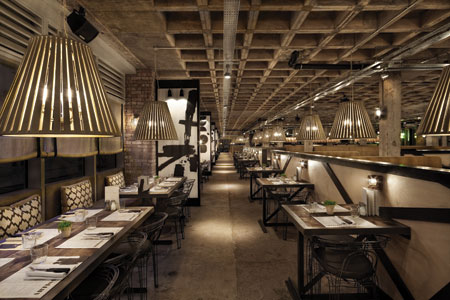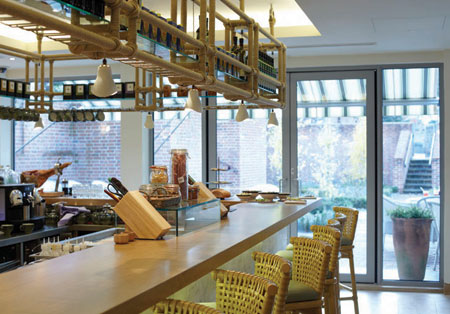Service: Breaking the rules
Once upon a time, fine-dining food arrived via a white glove, but these days, it could very easily arrive courtesy of a T-shirt-clas, tattooed arm. Tom Vaughan asks what we expect of fine-dining service now.
Out has gone starchy formality, "sirs" and "madams"; and in has come tattoos, colloquialisms and a generally more relaxed vibe. But how did this all come about? And is it really as 
simplistic as waiters rolling up their sleeves and being chummy?
"When we started Arbutus in 2006, places where you found good food tended to be formal, stiff, fine-dining affairs," explains Will Smith, co-founder of London restaurants Arbutus, Wild Honey and Les Deux Salons. "There seemed to be a lack of personality on the floor. Waiters were like soldiers and they weren't allowed to express themselves. It was self-sustaining - restaurants that had a Michelin star tended to be like that, so restaurateurs thought that was what you had to do to be recognised by Michelin."
Robbie Bargh, founder of restaurant and bar consultancy Gorgeous Group, says the sea change that has come these last 10 years has been largely a generational thing: "Chefs and restaurateurs who grew up in awe of Michelin and everything it stood for have moved aside. Now, there is a new generation of restaurateurs who love food and - more importantly - food experiences," adds Bargh.
And it has been an international phenomenon: Bargh lists the likes of Barrafina and Polpo in
London, Pigeon in Portland, Frenchie and Spring in Paris, and Animal and Tasting Kitchen in Los Angeles
as major examples of 
restaurants that helped redefine the rule book.
For Tim Bacon, managing director of restaurant group Living Ventures, it was crucial that he sought inspiration from abroad as he developed the approachable service that characterises the group, from its gastropub brand through to fine-dining site Manchester House, which opened in autumn 2013 in Manchester.
"There's always been a certain 
section of London restaurants that seem to dictate to the rest of the country - which 
is why I looked internationally," says Bacon. "There are restaurants in the US, Australia and Italy that don't have the restrictions 
UK fine dining seems to have."
Informed opinion Any restaurant trend, of course, has to be driven by the customer: "Fifteen years ago when I worked at the Lanesborough hotel in London, waiter interaction was not what 
people wanted," says Michael West, general manager of Pollen Street Social in London. "But now, with so many food shows on TV and so much more knowledge among the public, guests want to know more and talk to waiters."
Customers want a casual vibe, and relaxing things front of house sounds like an easy thing to do - stick on a pair of jeans and throw in a bit of chat, right? Not so. It is as hard an art to master as more formal styles of service, says Kenneth Spiers, general manager at Lime Wood hotel (see panel). Traditional 
waiting had a de facto set of rules for waiters to follow, and little margin for error unless you dropped a plate or spilled the wine.
"Nowadays, there is a line with customers, but that line is not an exact science," says Spiers. "Staff have to learn to profile a guest. An approach that works with one customer might not work with another. It is an art. The benefit is that it delivers something that is not a formulaic approach, and we broadly get it right. When we don't, we make sure we recover."
It comes down to reading when a customer wants extra attention or chat and when they don't. "If there is a group of businessmen, we will largely leave them to themselves," says West. "But if we see a birthday party, we'll have some fun with them and maybe take them on a kitchen tour if they want it."
Everything from length of conversation through to language should differ according to the customer, says Peter Avis, restaurant manager of Babylon in London: "For example, we would never say "Hi guys" to a table of older guests. It really is all about reading your 
customers and reacting in the correct way."
A huge part of this is recruitment. Gone are the days when a CV spoke for itself. "Employ on personality, not on CV," says Smith. "I don't care where someone has worked. I want people with intelligence and personality - they are the ones that can communicate properly and not slip into a master-servant dynamic."
Of course, a passion for food and the desire to share it is paramount: "Staff need to be charming, engaging and intuitive," says Bargh. "But knowledge of ingredients and the genuine love of food is essential."
And don't ever assume you are doing someone a favour by giving them a job, continues Bargh: "The best restaurants have to be an attractive offer if you are to attract great, engaging team members. While what you pay front line staff is important, it's not the be all and end all. You need to be a great place to work to attract the best of the best."
With this more relaxed style, there is still a high degree of jeopardy: the possibility that a waiter will read a table wrong, over-talk or come across as too laissez-faire. If things go wrong and a table isn't enjoying their service or wants a bit more formality, West will tend to ask a manager to serve the table.
Meanwhile, be sure not to throw the baby out with the bathwater - while white gloves and bows are restricted to a few formal, top-end joints, there are still elements of hospitality that every guest appreciates, says West - folding a napkin when a customer is in the bathroom, or topping up wine and water.
The same fundamentals that underpin formal service are also the foundations for a more relaxed approach: "The core value of silver service is attention to detail, which is still a key factor in all elements of restaurant service, regardless of their formality," says Avis.
Silver service, of course, still has a big part to play in the future of the industry - it's the high watermark for opulence. "It will never go away," says West. "There will always be people who want to dress up and there will always
be places like the Ritz who do it fantastically."
However, whereas once upon a time fine-dining service seemingly came with a rule book of dos and don'ts, nowadays a waiter can pour a glass of Petrus with an arm of tattoos and still wow a customer.
"The ultimate ambition should be delivering pleasure and enjoyment to your guests," says Bargh. "That is hospitality today. The outcome has not changed - how we get there has."
Case study: Manchester house, Manchester
When Tim Bacon decided to add Manchester House to Living Ventures' empire of nationwide restaurant brands - which range from steak joint Blackhouse to upmarket, Pacific Rim-inspired Australasia - he was adamant about one thing: "It has to have a heart that resonates with us. It can't be someone else's interpretation of fine dining."
Having travelled extensively, Bacon drew inspiration from countries such as the US, Australia and Italy when it came to service style.
"There are no rules on a global level. One thing that we didn't want is for it to be stuffy, although it has still got to be special. This is our take on fine dining, not Terence Conran's."
While Bacon says he likes many of the trappings of fine dining, it is the attitude of the staff and the restaurant's approachability that defines its take on fine dining.
"I hate indifferent people - the 'I know more than you' attitude.
Our menus are clear and easy to understand and Aiden [Byrne, the head chef] will change and tweak any dish that a customer wants - I want to protect us at all times from arrogance."
Case study: Lime Wood Hotel, Hampshire Once upon a time a country house hotel came part and parcel with more traditional, formal dining. Yet when Lime Wood opened in Hampshire in 2009, it didn't take long for hotel director Kenneth Spiers to realise that its dining room didn't fit in with the rest of the property.
"It was much more formal - more akin to the traditional model - and it didn't fit in with the relaxed environment and ethos in the rest of the hotel," he says.
So in its place, they launched Hartnett, Holder & Co in February last year - a far more informal set-up with no tablecloths, small plates of Italian-inspired English food and a more breezy approach.
"This is fun dining - not fine dining," said Robin Hutson, chairman of the Lime Wood Group, at the time. "Formal restaurants have too many rules. We don't like rules at Lime Wood; they're restrictive and suffocating." The idea is to appeal to a 21st-century style of diner.
"Lifestyles have changed," says Spiers. "Some of our customers eat out in London four or five times a week, and they tire of an environment that is overly forced or fussy. This is the way the industry is going."












